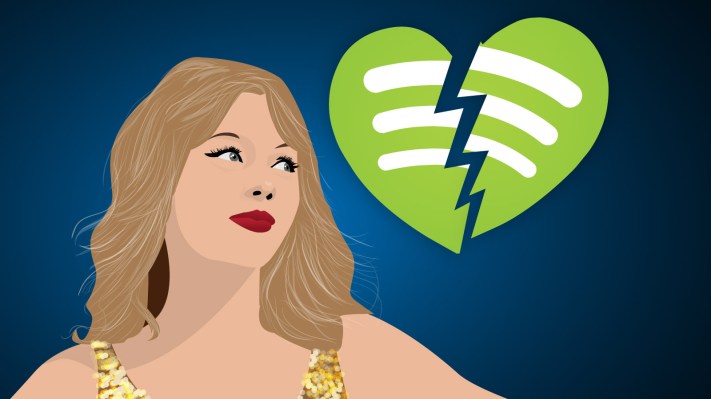Taylor Swift may have thought she’d ended the conversation about her music and its place on streaming services after dismissively calling them a “grand experiment” and pulling tracks from Spotify and other services. But the debate’s not done yet. Spotify is getting another word in.
Daniel Ek, the service’s CEO, posted a long response to the controversy today, along with a defense of his service, in which he revealed that the company has paid out over $2 billion to labels, publishers and collecting societies (who in turn distribute to songwriters and recording artists), and that Spotify now has 50 million active users, including 12.5 million subscribers each paying $120 per year.
The wider point of Ek’s post is not about Taylor Swift per se. He writes that Swift herself was on track to pull in $6 million this year for her own catalogue “before she pulled her catalog.” Of course, her new album, 1989, made around $12 million in its first week. Nielsen SoundScan says it broke the record for the biggest debut week of the year, selling 1.287 million copies in that period.
Ek notes that the $2 billion it has paid out breaks down to “a billion dollars from the time we started Spotify in 2008 to last year and another billion dollars since then.” In other words, the payments are accelerating as the service grows.
He says that 80 percent of the service’s paying users started out as free users. “If you take away only one thing, it should be this: No free, no paid, no two billion dollars,” he writes.
Importantly, Ek pitches Spotify as more crucial for the long-tail business of music, and the wider trends the industry is seeing, rather than vital to saving Swift’s bacon.
“[Swift] sold more than 1.2 million copies of 1989 in the US in its first week, and that’s awesome. We hope she sells a lot more because she’s an exceptional artist producing great music,” Ek notes. “But she’s the only artist who has sold more than a million copies in an album’s first week since 2002. In the old days, multiple artists sold multiple millions every year. That just doesn’t happen any more; people’s listening habits have changed – and they’re not going to change back. You can’t look at Spotify in isolation – even though Taylor can pull her music off Spotify (where we license and pay for every song we’ve ever played), her songs are all over services and sites like YouTube and Soundcloud, where people can listen all they want for free. To say nothing of the fans who will just turn back to pirate services like Grooveshark. And sure enough, if you looked at the top spot on The Pirate Bay last week, there was 1989…”
(The best of those YouTube 1989 videos has to be this one.)
Spotify is the world’s largest music streaming service (if you don’t, ahem, don’t count YouTube…) and it’s the largest in terms of paying subscribers, with more than the rest of the pure-music streaming services combined. Last week, we published numbers showing that in Europe, Spotify has actually passed iTunes in terms of royalty collections.
All the same, the company has been blindsided in more ways than one this year, even before Swift pulled her catalogue.
Amid rumors of an impending IPO, Spotify has had to consider what it might mean now that Apple has bought Beats and may well double down on streaming itself. It’s also been badgered in the past by a number of musicians for poor payouts. (Ironically, Spotify revealed the $1 billion payout marker at one of those critical moments, when artists led by Thom Yorke were publicly complaining about royalties on the service.)
